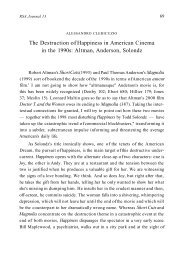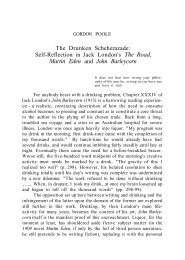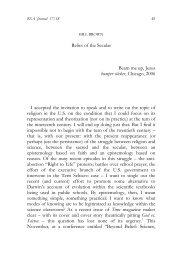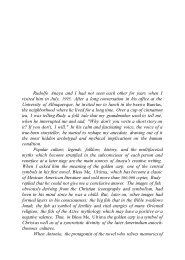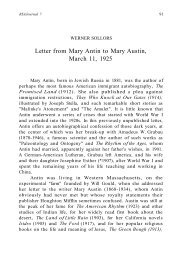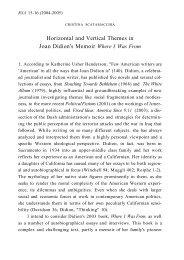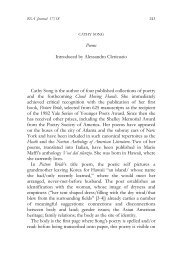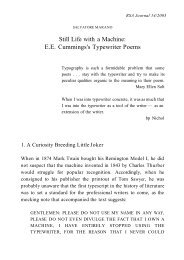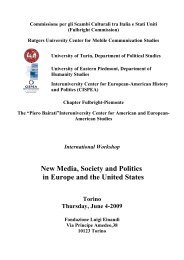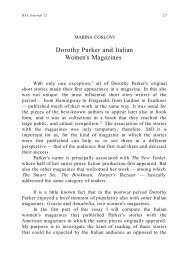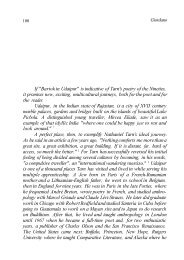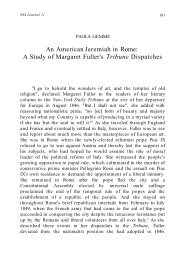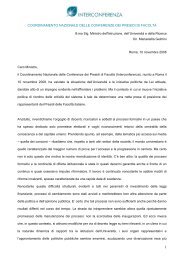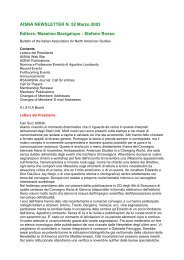Myth and Carnival in Robert Coover's The Public Burning - aisna
Myth and Carnival in Robert Coover's The Public Burning - aisna
Myth and Carnival in Robert Coover's The Public Burning - aisna
- No tags were found...
You also want an ePaper? Increase the reach of your titles
YUMPU automatically turns print PDFs into web optimized ePapers that Google loves.
RSA Journal 319Ages" (PB 58). In a moment of philosophical lucidity, Nixon articulateshis own Adornian critique of Enlightenment:Enlightenment did not illum<strong>in</strong>ate, but spread a greater darkness. <strong>The</strong>dream of utopia made men miserable, both through disappo<strong>in</strong>tmentwith their flawed existence <strong>and</strong> through the horrors they <strong>in</strong>flicted oneach other through pursuit of the rational-—<strong>and</strong> therefore unatta<strong>in</strong>able—ideal.Thus, "enlightenment" <strong>and</strong> "self-<strong>in</strong>terest" were two sidesof the same co<strong>in</strong>, <strong>and</strong> if there was evil <strong>in</strong> the world it was due to ourfailure to see both sides at once. "Enlightened self-<strong>in</strong>terest" was a stoicformula of acceptance, part of the tragedy of history. (PB 230)For Nixon/Coover, as for Horkeheimer <strong>and</strong> Adorno, the stoicformula of "enlightened self-<strong>in</strong>terest" is "part of the tragedy ofhistory" <strong>in</strong>sofar as it proposes a myth (a "rational ideal") or a utopiathat, once accepted as possible or true, generates the k<strong>in</strong>d of totalitarianideology of post-Hegelian philosophy <strong>and</strong> Nazism: "Was this morethan a mere symbolic expiation? Were the Rosenbergs <strong>in</strong> fact the verytrigger... for the ultimate holocaust?" (PB 337). Once a society givescredit to a myth or to a utopia, whoever does not share <strong>in</strong> "sympathy"with the social ideal must be erased, burned, physically elim<strong>in</strong>ated. Inhis book on America, Jean Baudrillard argues:If [one assumes that] the Utopia has been realized, then unhapp<strong>in</strong>essmust not exist, <strong>and</strong> poverty becomes untenable... America acknowledgesonly the evidence of wealth, the tautology of power... <strong>The</strong> poorwill be forgotten, ab<strong>and</strong>oned, <strong>and</strong> will be made disappear. It is the logicof the Must Exit. Poor people must exit. <strong>The</strong> ultimatum of wealth <strong>and</strong>efficiency erases them. Obviously, s<strong>in</strong>ce they have had the bad taste notto accord with the general consensus... "<strong>The</strong> Utopia has been realized;let those who did not participate disappear." (Baudrillard 90)Not altogether differently, Coover seems to denounce the mercilessnessof the American myth; <strong>in</strong> his paranoid ponder<strong>in</strong>g on the trial,Nixon eventually concludes that, no matter whether the Rosenbergscommitted espionage or not, they are nevertheless guilty of hav<strong>in</strong>gbetrayed the "Great American Dream":I could even underst<strong>and</strong> their work<strong>in</strong>g free for the Phantom—I'd do thesame for Uncle Sam, though I was glad he had never asked this from me.How could he? Money is dignity, he's told me that himself. What I



